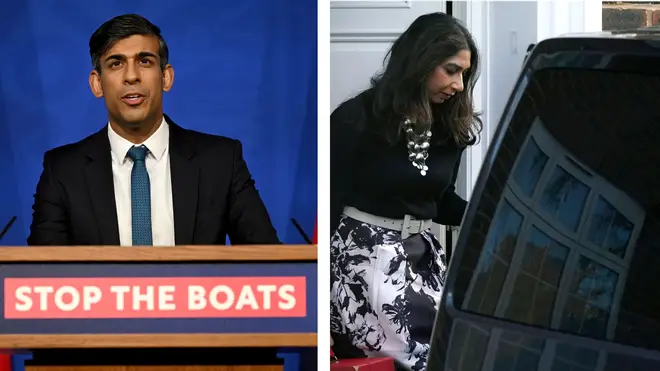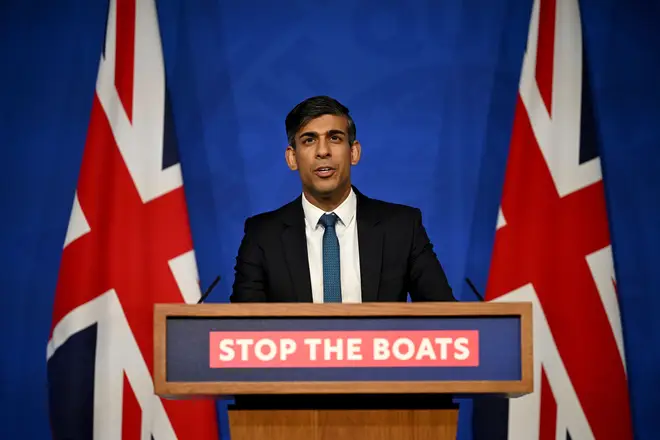
Clive Bull 1am - 4am
15 November 2023, 16:53 | Updated: 15 November 2023, 17:07

Rishi Sunak has said he will introduce emergency legislation to prevent further legal challenges to the government's Rwanda plan.
Supreme Court Judges ruled this morning the plan to send asylum seekers to Rwanda is unlawful because they can't be sure the country is safe.
He said he will bring forward emergency legislation to "stop our policy being repeatedly blocked"
"I will not allow a foreign court to block these flights. I am prepared to do what is necessary. I will not take the easy way out," the Prime Minister said.
Mr Sunak said the British people's patience "can only be stretched so thin, and they expect the boats to be stopped."
"We may still face challenges from the ECHR [European Court of Human Rights]
"I told Parliament I'm prepared to change our laws. I will not allow a foreign court to block the flights.

"I am prepared to do what is necessary to get flights off... I will not take the easy way out," Mr Sunak said.
He insisted the government is "making progress" on immigration.
"We have been working on a new international treaty with Rwanda," he said.
"This will provide a guarantee in law that those who are relocated from the UK to Rwanda will be protected against removal from Rwanda and it will make clear that we will bring back anyone if ordered to do so by a court.
"We will finalise this treaty in light of today's judgment and ratify it without delay.

Leader of the Opposition in Rwanda says her country a does 'not respect' the law
"But we need to end the merry-go-round. I said I was going to fundamentally change our country, and I meant it. So I'm also announcing today that we will take the extraordinary step of introducing emergency legislation.
"This will enable Parliament to confirm that with our new treaty, Rwanda is safe."
Mr Sunak's comments come not long after sacked former home secretary Suella Braverman took to Twitter to demand that Rishi Sunak introduces "emergency legislation" blocking off the European Convention on Human Rights.
The Prime Minister is facing unrest in the Tory ranks after the scheme to send asylum seekers to the east African nation was ruled to be unlawful by five of the UK's most senior judges.
Mrs Braverman said the Government must "legislate or admit defeat" as she called for measures to override both the ECHR, the Human Rights Act and other "routes of legal challenge".
She said: "Today's Supreme Court judgment is no surprise. It was predicted by a number of people close to the process. Given the current state of the law, there is no reason to criticise the judges. Instead, the government must introduce emergency legislation.
"The Bill must block off ECHR, HRA, and other routes of legal challenge. This will give Parliament a clear choice: control illegal migration or explain to the British people why they should accept ever greater numbers of illegal arrivals settling here.
"Those who - like me - believe that effective immigration control is vital must understand that they cannot have their cake and eat it: there is no chance of curbing illegal migration within the current legal framework. We must legislate or admit defeat."
In a unanimous Supreme Court ruling, five of the UK's most senior judges ruled that the Government's plan to deport some asylum seekers to Rwanda is unlawful.
The UK's highest court rejected the Home Office's argument that problems past and present with Rwanda's asylum system are "not a reliable guide" to how asylum seekers sent from the UK under the plans would be treated.
In their ruling, which the other justices agreed with, Lords Reed and Lloyd-Jones said Rwanda's history "cannot be effectively ignored or sidelined" as suggested.
They said there was "no dispute" that the Rwandan government entered into its deal with the UK "in good faith", with strong incentives to follow the terms of the arrangement.
Lords Reed and Lloyd-Jones continued: "Nevertheless, intentions and aspirations do not necessarily correspond to reality: the question is whether they are achievable in practice.
"The central issue in the present case is therefore not the good faith of the government of Rwanda at the political level, but its practical ability to fulfil its assurances, at least in the short term, in the light of the present deficiencies of the Rwandan asylum system."
The justices concluded there were grounds for believing that sending asylum seekers to Rwanda would "expose them to a real risk of ill-treatment" through being returned to their country of origin.
The Supreme Court justices later said there was "evidence of a culture within Rwanda of, at best, inadequate understanding of Rwanda's obligations under the Refugee Convention".
At the start of the decision, the judges said they were not dealing with the political aspects of the controversial policy.
Lords Reed and Lloyd-Jones said: "The court is not concerned with the political debate surrounding the policy, and nothing in this judgment should be regarded as supporting or opposing any political view of the issues."
In his summary of the decision, Supreme Court president Lord Reed said there were several international arrangements over the treatment of refugees, particularly protecting their right not to be returned to their country of origin.
These include the Refugee Convention, the UN Convention Against Torture, the UN International Covenant on Civil and Political Rights, as well as the European Convention on Human Rights.
He continued: "It is therefore not only the European Convention on Human Rights which is relevant to this case, as is sometimes thought.
"There are other international treaties which also prohibit the return of asylum seekers to their countries of origin without a proper examination of their claims."
Lords Reed and Lloyd-Jones later said in their ruling that the High Court had wrongly dismissed the evidence of the UN Refugee Agency, the UNHCR, about problems with the Rwandan asylum system.
They said: "UNHCR's evidence will naturally be of greatest weight when it relates to matters within its particular remit or where it has special expertise in the subject matter.
"Its evidence in the present case concerns matters falling within its remit and about which it has undoubted expertise."
While the Supreme Court ruled the policy as it stands is unlawful, the court did not rule out plans being lawful in the future.